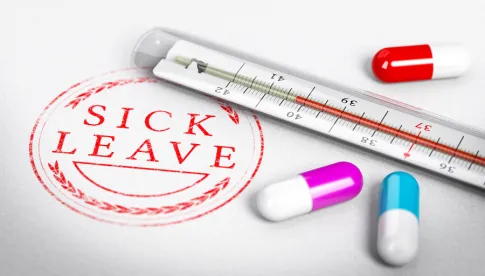The New Jersey Department of Labor and Workforce Development (NJDOL) recently issued proposed regulations to implement the New Jersey paid sick leave law (PSLL), which goes into effect on October 29, 2018. The proposed regulations address many questions New Jersey employers have about the new law, but other areas of uncertainty remain.
Here is a summary of the key proposed regulations:
Integration with Existing PTO Policies. The regulations confirm that an employer’s existing paid time off (PTO) policy will be in compliance with the PSLL if it complies with the accrual, use, payment, and carry over provisions of the PSLL.
No Recordkeeping for Exempt Employees. Some good news! The proposed regulations state that:
The employer is not required to maintain (or, therefore, retain) records documenting hours worked with regard to an employee who is exempt under either the Federal Fair Labor Standards Act, 29 U.S.C. §§ 201 et seq., or the New Jersey Wage and Hour Law, N.J.S.A. 34:11-56a et seq., and for whom the employer either advances earned sick leave under N.J.A.C. 12:69-3.4, or for whom, under N.J.A.C. 12:69-3.3(c), the employer chooses to presume solely for the purpose of calculating earned sick leave accrual that the employee works 40 hours per week. (Emphasis added.)
Required Notice and Posting. The proposed regulations state that the required notice may be provided by email, and the required posting may be posted via “an internet site or intranet site for exclusive use by its employees and to which all employees have access.” The NJDOL has not yet made the required notice/posting available.
Independent Contractors. The proposed regulations state that the test to determine whether a worker is an employee (and, therefore, covered under the law) or an independent contractor (and, therefore, not covered) will be the “ABC” test currently used under the state’s unemployment compensation law.
Hours Worked. The proposed regulations state that “hours worked” for purposes of the accrual method shall be defined in accordance with New Jersey’s existing wage and hour regulations under NJAC 12:56-5.
Benefit Year. The proposed regulations state that the employer must establish a single benefit year for all employees. If the employer wishes to change the benefit year, the employer must supply the NJDOL with specified, detailed information, and the NJDOL can refuse the change if it determines the change is intended to prevent use or accrual of PSL.
Current Employees. The proposed regulations state that employees hired on or before October 29, 2018 must begin to accrue earned sick leave no later than October 29, 2018.
Foreseeable Need. The proposed regulations define what is meant by a “foreseeable” need for paid sick leave (“such as a scheduled doctor’s visit”)—which requires no more than 7 days advance notice.
Unforeseeable Need. The proposed regulations define what is meant by a need for paid sick leave that is “not foreseeable” and gives as an example “an employee wakes up in the morning with a fever and does not feel well enough to report for work that morning.”
Blackout Dates. The proposed regulations state that the blackout dates when an employer can prohibit the foreseeable use of paid sick leave:
[S]hall be limited to verifiable high-volume periods or special events, during which permitting the use of foreseeable earned sick leave would unduly disrupt the operations of the employer.
i. An example of a high-volume period would be, for an airline industry employer, the period during which they experience a predictable increase in customer activity (which is to say, flying) in and around a particular holiday, like Thanksgiving.
ii. An example of a special event would be, for a manufacturer of retail products, the day or week during which it is making a new product available for the first time (that is, a product launch).
In addition, the proposed regulations state that “the employer shall provide reasonable notice to its employees of [the blackout dates] on which its employees are prohibited from using foreseeable earned sick leave.”
Rate of Pay. The proposed regulations address the rate at which employees must be paid when using paid sick leave and address the following scenarios:
(d) Where an employee has two or more different jobs for the same employer or if an employee’s rate of pay fluctuates for the same job, the rate of pay for earned sick leave shall be the amount that the employee is regularly paid for each hour of work as determined by adding together the employee’s total earnings, exclusive of overtime premium pay, for the seven most recent workdays when the employee did not take leave and dividing that sum by the total hours of work during that seven-day period.
(e) Where an employee is paid by commission, whether base wage plus commission or commission only, the employer must pay the employee during earned sick leave an hourly rate that is the base wage or the State minimum wage rate, whichever is greater.
(f) When an employee is paid on a piecework basis, whether base wage plus piecework or piecework only, to calculate the employee’s rate of pay for earned sick leave, the employer shall add together the employee’s total earnings for the seven most recent workdays when the employee did not take leave and divide that sum by the number of hours the employee spent performing the work during workdays.
. . .
(g) Where an employee uses earned sick leave during hours that would have been overtime if worked, the employer is not required to pay the overtime rate of pay.
. . .
(i) Where the amount of a bonus is wholly within the discretion of the employer, the employer is not required to include the bonus when determining the employee’s rate of pay for earned sick leave purposes.
Penalties. The proposed regulations set forth in detail the hearing procedures and the penalties for violations of the PSLL.
The proposed regulations do not address every open question, but do address many. The NJDOL will accept comments on the proposed regulations for 60 days, until December 14, 2018, and the final regulations will be issued sometime thereafter. It is likely that the final regulations will not be substantially different from the proposed regulations.




 />i
/>i

